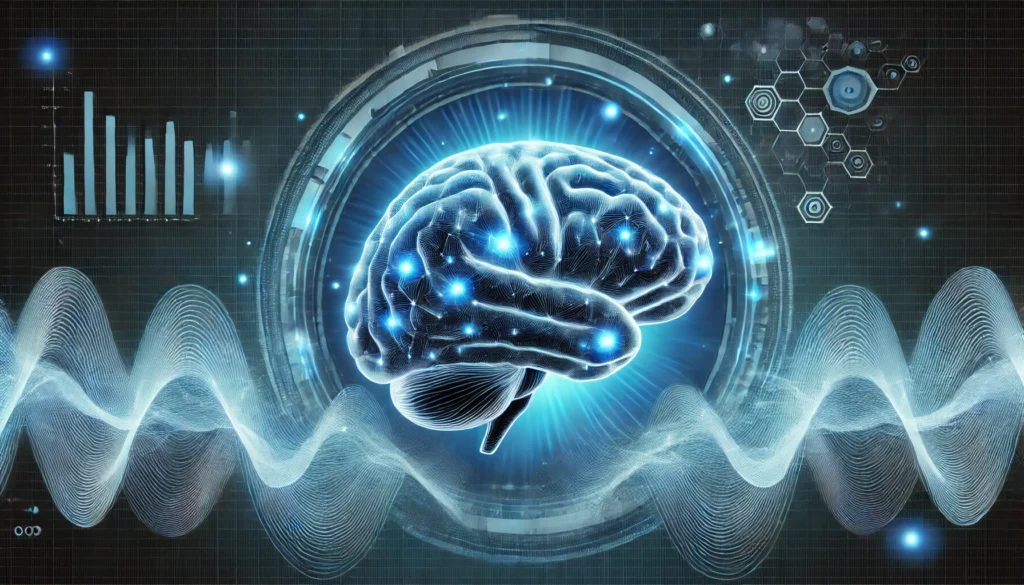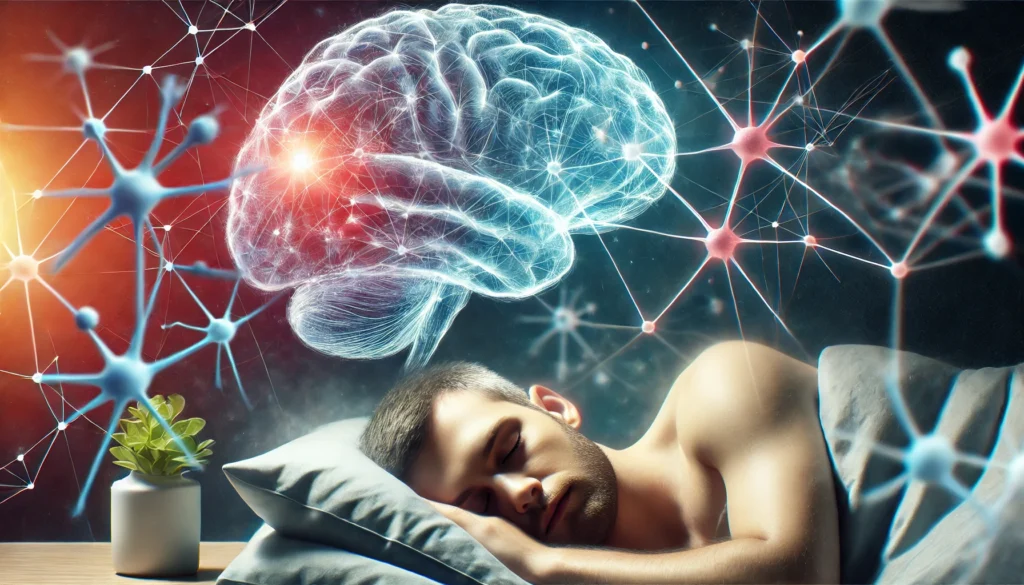Sleep is a cornerstone of cognitive health, influencing nearly every aspect of brain function. Emerging research highlights that adequate sleep is vital for maintaining cognitive performance and overall mental acuity. But why exactly is sleep so crucial for cognitive health?
You may also like: The Connection Between Sleep and Memory
Sleep and Memory Consolidation
During sleep, particularly during the rapid eye movement (REM) and slow-wave sleep (SWS) stages, the brain engages in memory consolidation. This process involves the stabilization and integration of new information into long-term memory, enhancing our ability to recall information and apply knowledge. The hippocampus, a brain region pivotal for learning and memory, communicates with the neocortex during sleep, transferring newly acquired information for long-term storage.
Moreover, the intricacies of memory consolidation highlight the importance of sleep architecture. Each stage of sleep contributes uniquely to processing different types of memories, such as procedural and declarative memories. Disruptions in these stages can lead to fragmented memories and impaired learning, illustrating how integral uninterrupted sleep is to cognitive health.
Enhancing Learning and Creativity
Sleep not only solidifies memories but also fosters creativity and problem-solving. It is during the REM stage of sleep that the brain synthesizes new ideas by linking disparate pieces of information. This is why we often experience sudden insights or “Eureka!” moments after a good night’s rest.
In addition to facilitating creativity, sleep enhances our ability to navigate complex problems. During sleep, the brain reorganizes and restructures information, allowing for a deeper understanding of learned concepts. This restructuring aids in adapting to new situations and challenges, thereby expanding our cognitive flexibility and innovative capabilities.
Emotional Regulation and Psychological Resilience
Beyond memory and learning, sleep plays a pivotal role in regulating emotions and building psychological resilience. Adequate sleep supports the brain’s ability to process emotions, aiding in emotional stability and reducing stress responses. Lack of sleep, conversely, can heighten negative emotional reactions and diminish the ability to cope with stress.
Furthermore, sleep deprivation has been linked to an increased risk of mental health issues such as anxiety and depression. By supporting the brain’s emotional processing systems, sleep fosters mental well-being and resilience, underscoring its importance for maintaining psychological health alongside cognitive functions.
How Does Sleep Affect Cognitive Function?
The intricate mechanisms by which sleep affects cognitive function are a testament to the brain’s complexity. A lack of sleep disrupts these processes, leading to significant declines in cognitive performance.
The Impact of Sleep Deprivation on Cognitive Performance
Sleep deprivation impairs attention, alertness, and concentration, making it challenging to process information efficiently. It also affects higher-order cognitive processes such as judgment, decision-making, and logical reasoning. Research has shown that sleep-deprived individuals often exhibit decreased problem-solving skills and increased susceptibility to cognitive biases.
Chronic sleep deprivation can lead to cumulative cognitive deficits, which may manifest as persistent attention lapses and memory impairments. Over time, this can affect professional performance, academic achievements, and daily life activities, making sleep an essential aspect of maintaining long-term cognitive health.

Neurotransmitter Regulation and Synaptic Plasticity
Sleep regulates neurotransmitters—chemical messengers crucial for communication between neurons. It also facilitates synaptic plasticity, the brain’s ability to strengthen or weaken synapses based on activity levels. This neuroplasticity underlies our capacity to learn, adapt, and form memories, underscoring the importance of sleep in maintaining cognitive flexibility and resilience.
Moreover, sleep promotes the restoration of neurotransmitter balance, which is disrupted during wakefulness. This restoration is critical for maintaining the brain’s communication networks, allowing for efficient information processing and cognitive function throughout the day.
Sleep’s Role in Cognitive Recovery and Restoration
Beyond regulating neurotransmitters, sleep serves as a period of cognitive recovery and restoration. During sleep, the brain reduces its synaptic activity, which helps to prevent neural exhaustion and preserve energy. This downscaling process is vital for maintaining cognitive performance and ensuring the brain is ready to tackle new challenges upon waking.
Additionally, sleep facilitates the repair of neural tissues and the clearance of metabolic waste products. These restorative functions are essential for sustaining cognitive health and preventing neurodegenerative diseases, highlighting sleep’s role in safeguarding brain integrity over the long term.
Sleep and Cognitive Performance: The Science Behind It
The science of sleep and cognitive performance is a burgeoning field, with researchers continually uncovering new insights into how sleep influences the brain’s functioning.
Circadian Rhythms and Cognitive Function
Circadian rhythms, the body’s internal clock, play a pivotal role in regulating sleep-wake cycles and cognitive performance. Disruptions to these rhythms, such as those caused by shift work or jet lag, can lead to cognitive impairments. Aligning sleep patterns with natural circadian rhythms can enhance cognitive performance and overall well-being.
Understanding the interplay between circadian rhythms and cognitive function has led to the exploration of chronobiology—studying how biological rhythms affect health. This research provides insights into optimizing sleep timing and duration to align with individual circadian preferences, potentially enhancing cognitive abilities and reducing the risk of sleep disorders.
The Glymphatic System: Brain Detoxification During Sleep
Recent discoveries have highlighted the role of the glymphatic system—a waste clearance system in the brain that removes toxins during sleep. This detoxification process is crucial for maintaining cognitive health, preventing neurodegenerative diseases, and ensuring optimal brain function.
The glymphatic system’s activity peaks during sleep, emphasizing the importance of sleep for brain detoxification. By clearing away harmful proteins and metabolic waste, this system helps to maintain neural health and prevent the accumulation of substances linked to cognitive decline, such as beta-amyloid plaques associated with Alzheimer’s disease.
The Role of Sleep Stages in Cognitive Processes
Each stage of sleep contributes uniquely to cognitive processes, with REM and non-REM stages playing distinct roles. REM sleep is associated with emotional processing and creativity, while non-REM sleep supports memory consolidation and restorative functions. This differentiation underscores the importance of a balanced sleep cycle for comprehensive cognitive health.
Research into sleep stages has also revealed their impact on different types of learning. For instance, procedural learning, which involves acquiring new skills, is closely linked to non-REM sleep, while REM sleep enhances the integration of complex information. These findings highlight the multifaceted role of sleep stages in supporting diverse cognitive functions.
Why Sleep Is Important for Cognitive Health: Practical Implications
Understanding the importance of sleep for cognitive health has practical implications for improving mental acuity and overall well-being.
Strategies for Enhancing Sleep Quality
- Establish a Consistent Sleep Schedule: Going to bed and waking up at the same time every day helps regulate the body’s internal clock, promoting better sleep quality. Consistency strengthens circadian rhythms, aiding in the synchronization of sleep-wake cycles with natural daylight.
- Create a Restful Sleep Environment: A dark, quiet, and cool bedroom can enhance sleep quality. Consider using blackout curtains, earplugs, or white noise machines to minimize disturbances. Incorporating calming scents like lavender can further promote relaxation and improve sleep onset.
- Limit Exposure to Blue Light: Blue light from screens can interfere with melatonin production, disrupting sleep. Limiting screen time before bed or using blue light filters can help mitigate this effect. Additionally, practicing digital detoxes and engaging in calming activities such as reading can prepare the mind for restful sleep.

The Role of Sleep Hygiene in Cognitive Health
Practicing good sleep hygiene—habits and practices conducive to sleeping well—is essential for cognitive health. This includes avoiding caffeine and heavy meals before bedtime, engaging in relaxation techniques, and creating a bedtime routine to signal to the body that it’s time to wind down.
Incorporating mindfulness practices such as meditation or deep breathing can further enhance sleep quality by reducing stress and anxiety. Establishing a pre-sleep ritual, such as taking a warm bath or listening to soothing music, can help create a peaceful transition into sleep, fostering both relaxation and cognitive rejuvenation.
The Connection Between Physical Health and Sleep Quality
Physical health and sleep quality are deeply intertwined, with regular exercise and a balanced diet positively impacting sleep. Engaging in physical activity during the day can promote deeper sleep, while nutrient-rich foods support neurotransmitter production, essential for sleep regulation.
Conversely, poor sleep can lead to metabolic dysregulation, affecting energy levels and increasing the risk of chronic health conditions. By prioritizing sleep as part of a holistic approach to health, individuals can enhance both their physical and cognitive well-being.
Future Implications: Sleep, Cognitive Health, and Technological Advancements
As our understanding of sleep and cognitive health deepens, the future promises exciting advancements in personalized sleep interventions and technology-driven solutions.
Personalized Sleep Interventions
Advancements in sleep science are paving the way for personalized sleep interventions tailored to individual needs. By leveraging genetic, lifestyle, and environmental data, these interventions aim to optimize sleep quality and cognitive performance.
The integration of wearable technology and data analytics allows for the creation of customized sleep plans, addressing specific sleep disorders or lifestyle challenges. These personalized approaches can lead to more effective sleep solutions, enhancing cognitive health and overall quality of life.
Technology-Driven Solutions
Innovative technologies, such as wearable sleep trackers and smart sleep environments, are revolutionizing how we monitor and enhance sleep. These tools provide valuable insights into sleep patterns and offer actionable recommendations for improving sleep quality and cognitive health.
Beyond monitoring, technology is advancing towards creating interactive sleep environments that adapt to individual sleep needs. Smart mattresses and lighting systems can adjust to optimal conditions for sleep, further supporting the alignment of sleep patterns with natural circadian rhythms.
The Potential of AI and Machine Learning in Sleep Research
Artificial intelligence (AI) and machine learning are beginning to play a significant role in sleep research, offering the potential to analyze vast amounts of sleep data efficiently. These technologies can identify patterns and predict sleep disturbances, contributing to the development of targeted interventions.
AI-driven solutions can also personalize sleep recommendations by considering unique sleep patterns and health conditions. As these technologies evolve, they hold promise for enhancing our understanding of sleep and its impact on cognitive health, paving the way for more effective sleep interventions.

Conclusion: Embracing the Power of Sleep for Cognitive Excellence
In conclusion, the crucial role of sleep in cognition cannot be overstated. As we strive for cognitive excellence, prioritizing sleep is paramount. By understanding the profound impact of sleep on cognitive function and implementing strategies to enhance sleep quality, we can unlock the full potential of our minds and lead healthier, more productive lives.
The journey towards cognitive excellence begins with acknowledging sleep as a foundational pillar of health. Embrace the power of sleep, and let it be the foundation upon which your cognitive health and well-being flourish. Prioritizing sleep is an investment in mental acuity and overall life satisfaction, empowering us to thrive in an increasingly complex world.
Further Reading:
Experts recommend 7-8 hours of sleep for better brain health
What Lack of Sleep Does to Your Mind
Sleep for cognitive enhancement
Important Note: The information contained in this article is for general informational purposes only, and should not be construed as health or medical advice, nor is it intended to diagnose, prevent, treat, or cure any disease or health condition. Before embarking on any diet, fitness regimen, or program of nutritional supplementation, it is advisable to consult your healthcare professional in order to determine its safety and probable efficacy in terms of your individual state of health.
Regarding Nutritional Supplements Or Other Non-Prescription Health Products: If any nutritional supplements or other non-prescription health products are mentioned in the foregoing article, any claims or statements made about them have not been evaluated by the U.S. Food and Drug Administration, and such nutritional supplements or other health products are not intended to diagnose, treat, cure, or prevent any disease.


